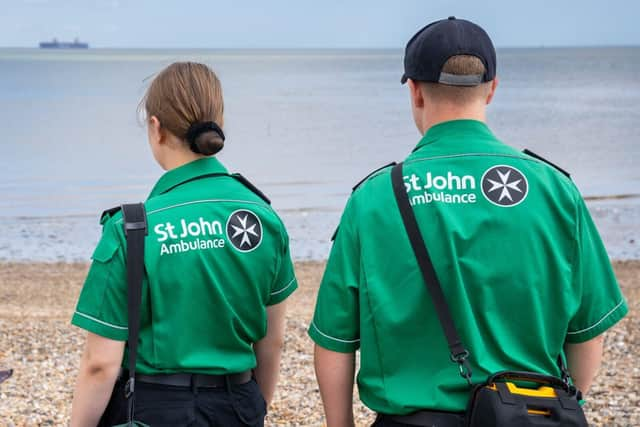Dive in, but stay safe: St John Ambulance shares first aid tips for Morecambe swimmers taking part in hospice 'Festive Dip'
and live on Freeview channel 276
Over recent years, wild swimming in winter has seen a surge in popularity, with people of all ages enjoying the physical and mental health benefits.
But, whether you're a seasoned "Festive Dipper" or trying it for the first time this winter, St John is urging swimmers to be aware of the dangers of cold-water shock.
Advertisement
Hide AdAdvertisement
Hide AdThis natural response occurs when the body is suddenly exposed to water at 15 degrees or less.


Matthew Booker, Associate Medical Director for St John Ambulance, said: “We want everyone to enjoy this great tradition safely, so we're encouraging people to do their research and plan ahead, pack warm clothes and something hot to eat or drink to warm up quickly after exiting the water.
"By following a few simple steps, you can help reduce the risks of cold-water shock developing into something more serious.”
St John Ambulance recommends:
- Take your time when submerging yourself in the water and splash water on your face as you get in. Also, check water temperatures and tides in UK coastal waters through various websites.
- Even strong swimmers can experience cold-water shock, so wear a tow float, or bring something you can lean on. A bright swimming cap will also make it easier for you to be found if you need help. Don't forget to let someone know where you are and go with a friend for added safety.
- If you start to feel panicked in the water or experience difficulty breathing, roll onto your back. Although the natural instinct may be to swim to shore, rolling onto your back and lengthening your exhales will help you relax and call for help. If possible, exit the water and warm up quickly to avoid hypothermia.
- Lastly, it's important to bring warm clothes and a hot drink for after. And remember, alcohol can worsen the situation, so it's best to avoid it.
Recently, sewage pollution and water quality emerged as one of the main barriers for people wanting to participate in the sport.
Advertisement
Hide AdAdvertisement
Hide AdMatthew said: "I'd recommend taking some simple precautions to minimize health risks associated with swimming in potentially contaminated water, which can cause a range of illnesses from minor infections to more severe gastrointestinal ailments and even hepatitis."
To stay safe, St John Ambulance encourages swimmers to use common sense, avoiding stagnant or cloudy water, algal blooms, and foul-smelling areas.
Look out for warning signs and avoid discharging outlet pipes.
Utilising resources from local swimmers and websites like the Environment Agency's "SwimFo" interactive data can also provide valuable information.
Advertisement
Hide AdAdvertisement
Hide AdCover any cuts with waterproof plasters before entering the water, practice good hygiene by thoroughly washing yourself after swimming and before eating, and exercise extra caution after heavy rainfall when waterways are more likely to be polluted.
If you do feel unwell after swimming, your local pharmacist can give advice about minor skin, ear, eye or gastrointestinal symptoms.
Visit https://www.sja.org.uk/